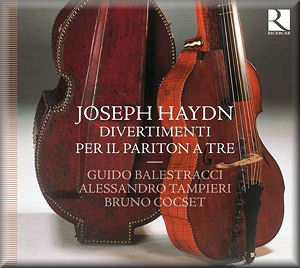 |
 |
|


alternatively
CD:
MDT
AmazonUK
AmazonUS
Sound Samples & Downloads
|
Franz Joseph HAYDN (1732 - 1809)
Divertimenti per il Pariton a Tre
Trio in a (H XI,66) [10:14]
Trio in D (H XI,113) [12:29]
Trio in b minor (H XI,96) [11:57]
Trio in G (H XI,70) [8:41]
Trio in G (H XI,59) [9:09]
Trio in D (H XI,42) [12:25]
Trio in C (H XI,101) [08:33]
 Guido Balestracci (baryton), Alessandro Tampieri (viola), Bruno Cocset (cello)
Guido Balestracci (baryton), Alessandro Tampieri (viola), Bruno Cocset (cello)
rec. October 2010, Église Notre-Dame, Centeilles, France. DDD
 RICERCAR RIC 315 [73:16]
RICERCAR RIC 315 [73:16] 
|
|
|
The baryton is almost exclusively associated with Joseph Haydn.
It was a much older instrument, though. Its origins go back
as far as the early 17th century. In his liner-notes Jérôme
Lejeune states that the descriptions of the instrument in its
early stages widely differ and often have not that much in common
with the baryton as we know it from Haydn's time. In the 18th
century it was especially popular in southern Germany and Austria.
Because Haydn's output for the baryton is so large, not that
much is known about other composers' works for the instrument.
What is known is that at least Johann Joseph Fux and Attilio
Ariosti wrote arias with an obbligato part for the baryton.
Leopold Mozart gave this description in his Versuch einer
gründlichen Violinschule (1756): "This instrument has,
like the gamba, six or seven strings. The neck is very wide,
with the back surface hollowed out and open, under which run
nine or ten brass and steel strings. These are plucked with
the thumb, so that in fact whilst the main melodic line is played
with the bow on the gut strings strung on the front of the instrument,
the thumb simultaneously plays the bass line by plucking the
strings under the neck. It is for this reason that the pieces
need to be specifically composed. It is, incidentally, one of
the most graceful of instruments." The German composer
and author Friedrich August Weber (1753-1806) described the
sound as a combination of viola da gamba and harp and wrote
that its sound moved him to tears.
There is some difference of opinion about the abilities of Haydn's
employer. Those are generally considered rather limited. But
Jérôme Lejeune believes one shouldn't underestimate his
skills. "Haydn does not hesitate to demand pizzicato playing
of the sympathetic strings on a regular basis. The player is
frequently required to play a melody line on the bowed strings
and to accompany it with pizzicato notes; an excellent command
of the instrument is clearly required".
Nikolaus continuously urged Haydn to compose music which he
could play at his beloved instrument. The result is a huge corpus
of more than 160 pieces for or with baryton. The largest part
of this output comprises 126 trios for baryton, viola - or violin
in a handful of trios - and cello. Almost all of them are in
three movements: a slow movement, a fast movement and a menuet,
mostly in that order. But Haydn would not be Haydn if he hadn't
changed the order of movements now and then. Because of their
character the trios rank among the genre of the divertimento.
That was also their function: Prince Nikolaus played them for
his own entertainment. That doesn't mean Haydn sticks to what
one may expect from a divertimento. The slow movements are often
quite expressive. And although the large majority of the trios
are written in D, G or A, Haydn also has written some trios
in other keys, even some in the minor, like the Trio in b
minor (H XI,96). As a result it has a considerably darker
colour than most trios and is the most 'serious' piece of this
disc.
The artists have made a nice and imaginative choice from Haydn's
large output. Fortunately they have largely avoided the most
frequently recorded trios. Haydn's complete oeuvre with baryton
has been recorded by the Esterházy Ensemble (Brilliant
Classics). As good as Haydn's music and these performances
are, many will find this too much of a good thing. For them
this disc offers an excellent alternative. The playing is technically
immaculate, and the interpretation goes to the heart of Haydn's
music. There is no lack of expression in the slow movements,
whereas the fast movements are playful and explore Haydn's subtleties.
Although the recording was made in a church, it has the right
atmosphere. The balance within the ensemble is optimal.
In the English translation of the liner notes Jérôme Lejeune
writes about the Trio No. 107 which is remarkably written
for baryton solo. "We have of course not been able to resist
the temptation to add it to our programme". Apparently
the artists had second thoughts: the trio has not been included,
and the whole passage from the liner-notes is absent in the
original French version and in the German translation. Maybe
on a later disc?
Let's enjoy what is on offer here. Haydn's trios are irresistible,
and the artists have done everything to bring them to life.
Johan van Veen
http://www.musica-dei-donum.org
https://twitter.com/johanvanveen
|
|












